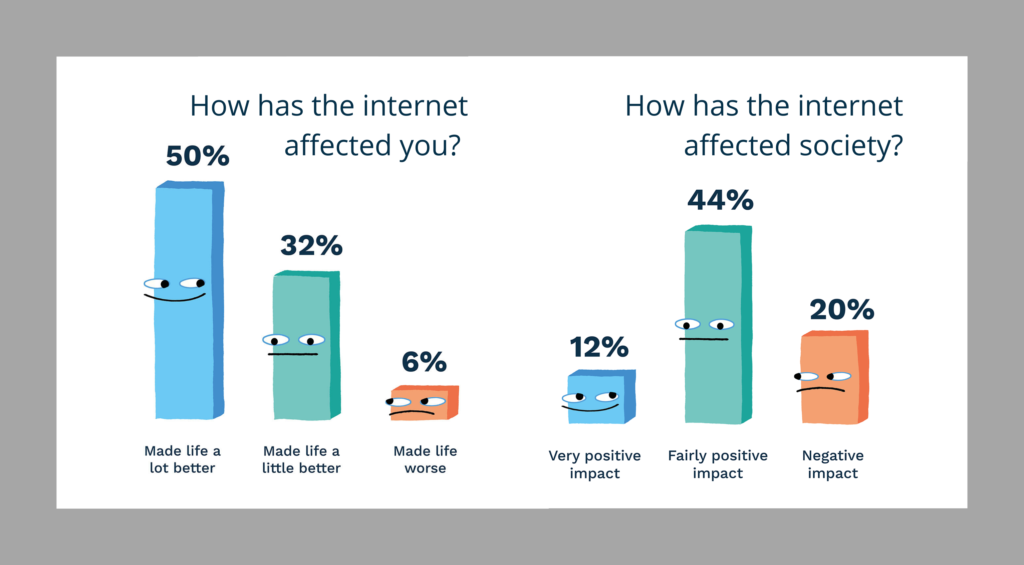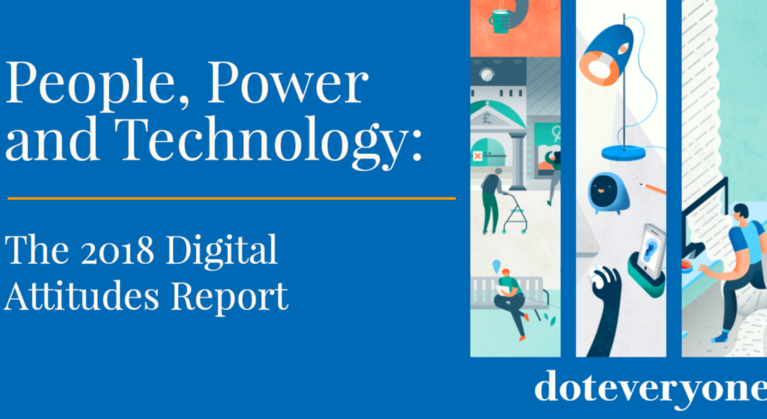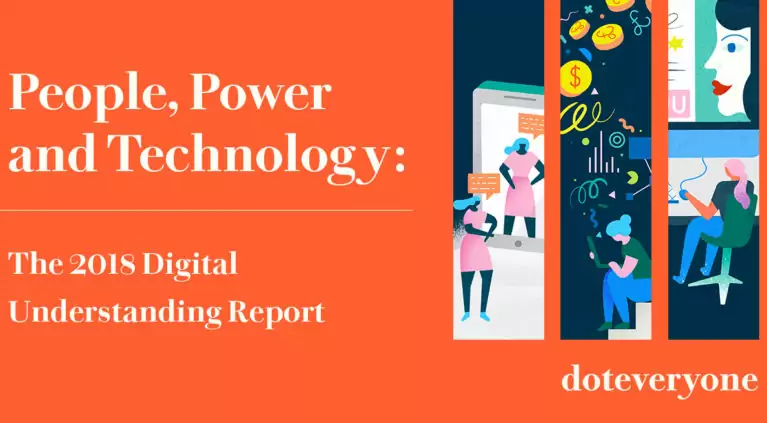Introducing People, Power and Technology: The 2020 Edition
People, Power and Technology 2018 was a defining moment for Doteveryone. It was first of its kind research which revealed a gulf between the perceived positive personal benefits and negative societal impacts of technology and anticipated the ‘techlash’ that has followed.

Why it’s time to re-examine the public’s relationship with technology
Two years feels closer to a decade in a sector that moves as quickly as tech. Since our 2018 research, we’ve had the Cambridge Analytica scandal, the introduction of GDPR, tech-worker protests, the bitcoin boom and four (probably soon to be five) DCMS Secretaries.
The world has moved on, and we should understand how the public has too.
Elsewhere in the responsible tech ecosystem, others have built upon our work to document declining trust in the wake of the “techlash”, the growing chorus for more tech regulation and the public’s experiences of online harms. Now feels like a good time for us to refresh the People, Power and Technology programme, to ensure we’re moving the conversation on and not rehashing yesterday’s news.
In this spirit, we’re going beyond mapping changes in understanding to also explore the public’s attitudes towards the tech trends coming down the tracks. For example, the UK is set to bring into law first-of-its-kind regulation in relation to online harms to help keep people safe on the Internet, while Nesta’s 2020 predictions span the emergence of digital twins to an outbreak of “Monty Python-style silly walks” to foil gait-tracking technologies.
But future-gazing shouldn’t just be left to policymakers and think tanks like us. It’s important to give the public space to articulate their vision for the future before it happens – not as a token gesture or out of curiosity once tech’s impacts are already being felt.
So having reviewed how the landscape has shifted since we published the original People, Power and Tech reports and convened an advisory board of respected voices in responsible tech, we’ve arrived at three central areas – which we believe will have the most impact of furthering understanding of the public’s relationship with technology – for this survey to explore:
Measuring changing attitudes and understanding
The 2018 People, Power and Technology survey explored the public’s digital attitudes and understanding fairly broadly. It covered everything from tech’s impact on local businesses to people’s understanding about where to report Internet connectivity issues.
It was necessary to have such a wide scope because there was very little evidence available to work within these areas. Two years on, we’ll be trading breadth for depth and explore fewer topics, in greater detail.
Nonetheless, we’ll still be revisiting the main digital blindspots uncovered in 2018 – the machinations of targeted advertising, how prices can vary online and how news makes its way onto social media feeds, for example – to see if and how they’ve changed in this time. We’ll also be diving deeper into the public’s understanding of tech business models and emerging technologies like smart devices.
Choices, power and accountability
We’ll also be exploring the choices people make every day online and looking to find out how they keep themselves safe and secure, where people go to look for support and take advantage of the many benefits of being online.
We’d also like to go beyond this surface-level behaviour to unpick why people do – or don’t – take such actions, and expose the power dynamics at play between individuals, the state and the tech sector. Taking the hot topic of social media moderation as an example, if dodgy content goes unreported, is that because it doesn’t bother users or because they think platforms will ignore their complaints anyway?
Understanding what underlying motivations and beliefs are at play when people interact with digital tech has profound implications for regulation, media literacy strategies and the design of online services.
Values and trade-offs
A headline finding of our 2018 survey was that whilst 50% say the Internet has made life a lot better for people like themselves, only 12% say it’s had a very positive impact on society. We’ll be exploring this disconnect between the social and personal impacts of tech in more depth in this year’s research, and looking to identify exactly where these positives and negatives lie.
As part of this, we’ll present trade-offs such as access to cheap online services in exchange for personal data, the balance between clamping down on abusive behaviour and respecting freedom of speech online and the impacts of digitisation on offline services, to sketch out where the public’s ethical boundaries lie.
Get involved
Over the next few months, we’ll be working with long-time collaborators BritainThinks to explore these themes through a national survey and focus group series. We will be publishing our findings later this year, but if you’d like to help us shape the research in the meantime please get in touch at [email protected].
We’re particularly interested in any feedback on the following:
- The aspects of the 2018 research that was most interesting and useful to people
- Any research we should be aware of that explores the themes above
- How we can get our findings to reach the audiences that need to hear them the most
This research is made possible with thanks to the generous support of PwC, the Scottish Government, British Computing Society, Bulb, DCMS and Innovate UK

